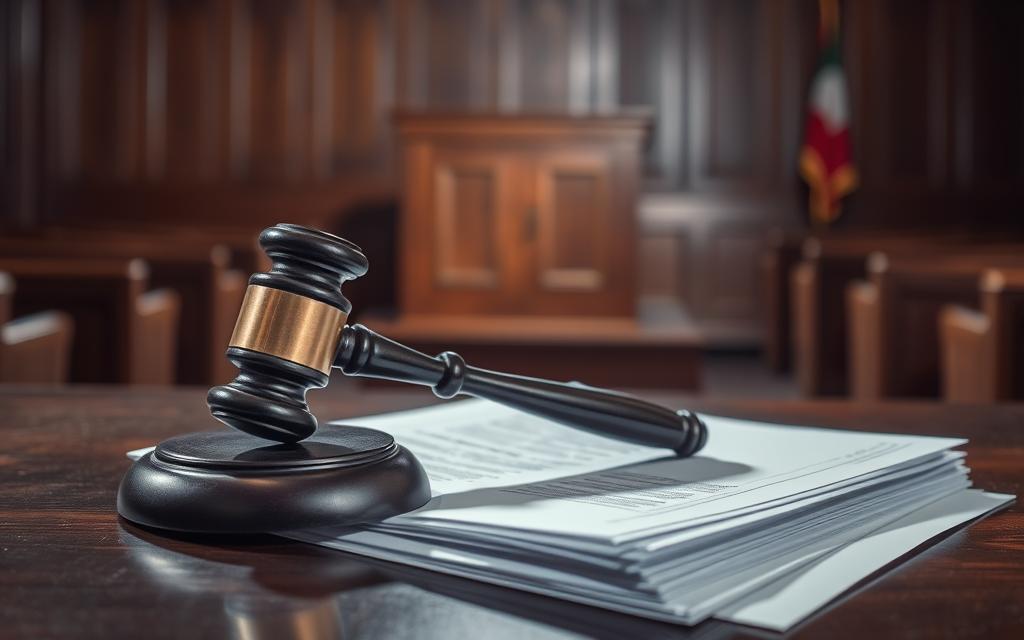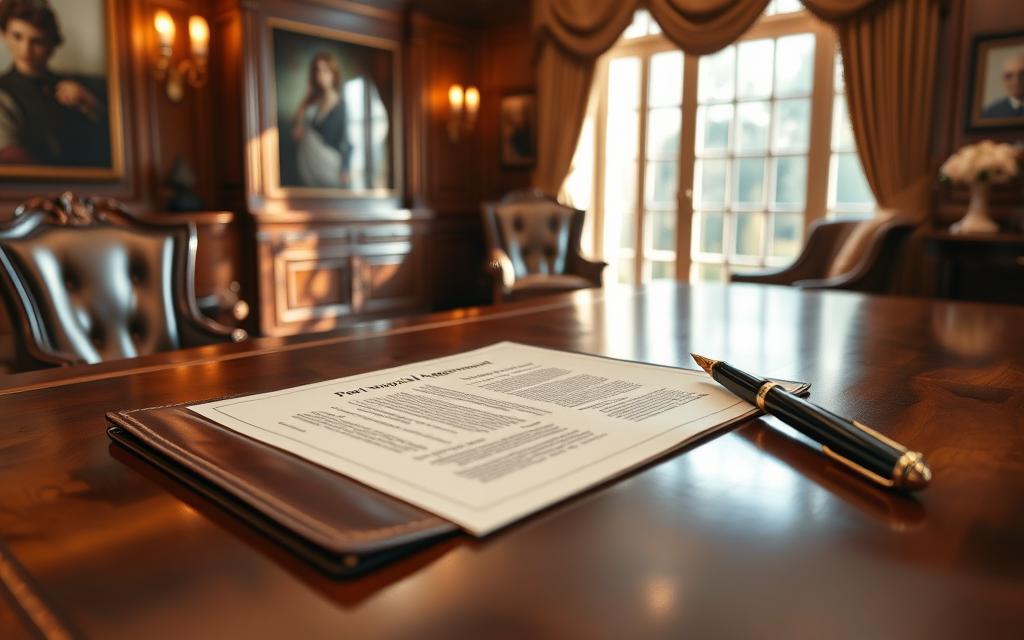Infidelity can break the trust in a marriage, leading to serious legal issues. Have you thought about how courts deal with cheating? They look at many things, like how the cheating affects the family and the marriage’s future.
Infidelity can lead to big legal problems in a marriage. Courts consider things like proof of cheating, how it affects kids, and money spent on lovers. They also look at if the cheater tells the truth about it.
The court needs strong evidence to prove cheating. This can change who gets what in a divorce, child support, and custody. It’s a complex area of law.
What Constitutes Legal Infidelity in Marriage
Infidelity in marriage is more than just physical cheating. It also includes emotional and digital betrayals. Knowing the legal side of infidelity is key for couples facing relationship problems.
Physical Infidelity and Legal Definitions
Legal infidelity often means physical adultery. This is when someone has sex with someone other than their spouse. Laws about adultery vary by state. In some places, like Arizona, it’s a misdemeanor, which could mean jail time for both the cheater and their partner.
Emotional Affairs and Their Legal Standing
Emotional affairs, though not physical, can also be seen as cheating by the law. These secret feelings for someone outside the marriage can hurt the relationship. Courts might even issue sanctions or restraining orders if kids are exposed to the cheating spouse’s lover.
Digital and Cyber Infidelity Recognition
The rise of technology has made infidelity more complex. Online relationships, sexting, and cybersex are now recognized as cheating by courts. While photos alone might not prove cheating, other evidence like witness statements or documents can help.
The legal side of infidelity is intricate. Emotional distress damages and marriage counseling are often key in solving these issues. Understanding state laws is essential for dealing with infidelity.
Proving Adultery in Court: Evidence Requirements
In divorce cases, proving adultery is key, like in South Carolina where it’s a fault ground. To meet the “clear and convincing” evidence standard, various evidence types are used. This includes photographs, voice recordings, emails, witness statements, and private investigators. Having direct evidence of the affair is crucial.
Getting the right evidence to prove adultery in court is tough. Hiring a private investigator is a common step, but their role must be disclosed. The evidence must meet legal standards and pass court scrutiny.
- Photographs, videos, and audio recordings can provide strong visual and auditory proof of the affair.
- Emails, text messages, and social media activity can show digital communication between the spouses.
- Witness statements from those who know about the affair can back up the evidence.
- Financial records, like hotel receipts, can also prove an extramarital relationship.
The burden of proof for adultery in South Carolina is high, at “clear and convincing.” But, with a thorough evidence collection and good legal help, proving adultery is possible. This can greatly affect the divorce outcome.

Legal implications of infidelity in a marriage
The legal effects of infidelity in marriage change a lot based on the state’s laws. Some places still have criminal penalties for adultery, but these laws are rarely enforced. Yet, infidelity can greatly affect divorce proceedings.
Divorce Proceedings and Infidelity
In many places, adultery is seen as a fault-based ground for divorce. This can influence how assets are split, alimony, and even who gets custody of the kids. The exact impact depends on the state’s laws and the case’s details.
- In Georgia, a spouse might not get alimony if their adultery is proven.
- In community property states, where assets are split equally, infidelity can lead to unfair splits if one spouse spent marital money on the affair.
- Child custody decisions might also be affected by infidelity if the court believes the kids were exposed to bad situations because of the affair.
It’s key to remember that the legal effects of infidelity vary a lot from place to place. Getting advice from a skilled family law attorney is very important when dealing with divorce and infidelity.
Criminal Penalties for Adultery
Even though adultery is a crime in a few states, like Arizona, these laws are rarely followed. In Arizona, adultery is a Class 3 misdemeanor, which can lead to up to 30 days in jail. But, these penalties usually don’t affect most divorce cases involving infidelity.
Financial Consequences of Marital Infidelity
Infidelity can lead to big financial problems in a marriage. If a cheating spouse used marital assets for their affair, the court might give more assets to the faithful spouse. This is called “dissipation of marital assets.” Financial infidelity, like hiding debts or making secret big buys, can also change divorce settlements and alimony payments.
In California, a no-fault state, cheating doesn’t directly affect who gets custody of the kids. But, disputes over infidelity can make it harder to agree on asset division and child custody.
While you can’t sue your spouse for financial cheating directly, you can take legal steps during divorce. Financial infidelity makes dividing assets harder by adding complexity and mistrust. This can change how assets are split fairly.

A 2021 Harris poll found that 85% of people said financial dishonesty hurt their relationship. And 52% thought it was worse than cheating. Financial infidelity includes hiding debt, making secret big buys, hiding assets, and lying about income.
Impact on Child Custody and Visitation Rights
In child custody disputes, infidelity can greatly affect custody and visitation rights. Courts in the U.S., including Texas, focus on the child’s best interest. This is when deciding on custody and visitation.
Adultery itself might not directly decide custody. But, if the affair harms the child, courts might change custody. For example, if the children saw something they shouldn’t or were abused, custody could change to protect them.
Paramour Restrictions and Court Orders
Courts might put restrictions on the cheating spouse’s new partner around the kids. This is to keep the child safe from harm or bad influence. This is true if the new partner has a criminal record or history of violence.
Courts look at a lot of evidence, like emails and financial records. They might even use reports from private investigators. The goal is to make sure custody and visitation are in the child’s best interest, no matter what the parents did.
Parents in custody disputes need to talk to experienced family law attorneys. They can help protect their rights and the child’s best interests. Understanding how infidelity can affect custody and visitation is key in these tough situations.
GPS tracking a cheating partnermade
Property Division in Adultery Cases
Divorce proceedings can get tricky when adultery is involved. The way adultery affects property division changes from state to state. In places like South Carolina, where adultery is a fault-based reason for divorce, it can really change how assets are split.
About 15% of divorces in South Carolina are due to adultery. The spouse who was cheated on might get 10-15% more of the property. Adultery can also affect alimony, possibly stopping the cheating spouse from getting support.
In states where adultery matters, courts try to divide assets fairly. The emotional and financial damage from cheating can make this hard. That’s why getting legal help is key.
In states where divorce doesn’t need to be fault-based, adultery’s impact is less. Unless cheating led to big financial problems or wasting of assets. Trying mediation or a collaborative divorce can make things easier.
How adultery affects property division really depends on the state’s laws and the case’s details. It’s important to understand the legal side and get professional advice when dealing with property division after cheating.

- Adultery can impact property division in fault-based divorce states like South Carolina.
- The betrayed spouse may be entitled to a larger share of marital assets, up to 10-15% in some cases.
- Adultery can also affect alimony decisions, potentially leading to the adulterous spouse being barred from receiving spousal support.
- In “no-fault” divorce states, adultery may have less impact on property division unless it led to financial misconduct.
- Seeking legal counsel and considering mediation or collaborative divorce can help navigate the complexities of property division in adultery cases.
Role of Private Investigators in Infidelity Cases
Private investigators are key in finding evidence of cheating, which is crucial in divorce cases. They use their skills to collect photos, watch people secretly, and record odd behaviors. They do this legally to make sure the evidence can be used in court.
Admissible Evidence Collection
The evidence found by private investigators must be legal to use in court. They must follow privacy laws and not break any rules to get information. They have to tell about their work in court and handle the evidence carefully to keep it valid.
- Photo/video evidence
- Financial records and documentation
- Audio recordings
- Unbiased testimonies
Legal Boundaries of Investigation
Private investigators in infidelity cases have to be careful. They must follow the law to protect people’s privacy. Staying professional and ethical is key to keeping the evidence and the case fair.
Using a trusted private investigator can help a lot in divorce cases. It can lead to better deals on property, money, and custody of children.
Alimony and Spousal Support Modifications
Infidelity can greatly affect alimony and spousal support in divorce cases. In some places, like Virginia, cheating can mean less or no alimony for the guilty spouse. The faithful spouse might get more money. But, how infidelity affects alimony changes with each state and case.
In Virginia, proving adultery can help in divorce cases. But, it doesn’t always mean less spousal support. The court looks at both spouses’ financial needs and abilities. Proving adultery in Virginia is hard, needing clear evidence of cheating and harm to the other spouse.
New York has moved to no-fault divorces, ignoring marital fault like infidelity. Yet, financial cheating can still sway judges in deciding support and property. This shows how cheating can still affect financial outcomes.
In Georgia, the spouse asking for alimony must show they need it and the other can pay. The length of the marriage can influence how long alimony lasts. If adultery caused the divorce, the cheating spouse can’t get alimony, according to Georgia law. Judges have the power to punish the cheating spouse, depending on the case.
Handling alimony and spousal support changes due to infidelity is tricky. It’s wise to get legal advice to understand the laws in your state. This can help you grasp the financial effects of cheating during a divorce.
No-Fault vs. Fault-Based Divorce Considerations
In the United States, couples can choose between no-fault and fault-based divorces. Knowing the differences is key to understanding the legal process. It helps in making a well-informed decision.
Pros and Cons of Each Approach
No-fault divorces are simpler and less likely to cause conflict. They don’t require proving fault. This makes the process faster and cheaper for both sides. Yet, fault-based divorces, like those citing adultery, might give advantages in property division or alimony in some places.
State-Specific Requirements
- In Texas, adultery is a fault ground for divorce. It needs strong evidence to prove the marriage’s breakdown.
- States like New Jersey also allow fault-based divorces. Adultery can affect alimony, asset division, and child custody.
- California, though, only offers no-fault divorces. It’s the only choice for couples ending their marriage.
The choice between no-fault and fault-based divorce depends on the case’s specifics. It also depends on the state’s laws and the couple’s goals. Getting advice from a legal expert is crucial. It ensures the couple’s rights are looked after.
Legal Protection Against Marital Assets Dissipation
When infidelity happens in a marriage, the law steps in to protect assets. Courts can stop one spouse from wasting joint money on things like affairs or gambling. This ensures that assets are divided fairly during a divorce.
Forensic accounting helps track and value any lost assets. This evidence is key for the court. Also, temporary orders can stop more assets from being lost while the divorce is being decided.
How courts handle asset loss varies by place. For example, in Colorado, they look at financial mistakes differently than personal faults like cheating. If they find evidence of loss, they might adjust who gets what.
Finding hidden assets is key to a fair split in a divorce. This means checking financial records and possibly using a forensic accountant. Taking legal action helps spouses protect their share of assets, reducing the harm from marital property loss and financial infidelity.
Court Orders and Temporary Restraining Orders
Courts may issue orders to protect spouses and their children in infidelity cases. A temporary restraining order can stop a cheating spouse from contacting their lover, near the kids. These orders help keep things stable during the divorce proceedings.
Courts can also freeze assets, set up temporary custody, or require counseling. These court orders protect everyone’s interests, aiming for a fair outcome.

Temporary restraining orders usually last a short time. But court orders that last longer come after a full hearing or agreement. These orders cover child custody, support, spousal maintenance, and property division, offering a lasting solution.
Breaking a court order or restraining order can lead to serious penalties. You could lose visitation rights or even go to jail. So, these legal steps are key in protecting families after infidelity.
Impact on Military Marriages and Benefits
Infidelity in military marriages has special effects that go beyond usual legal issues. The Uniform Code of Military Justice (UCMJ) makes adultery a crime. This can lead to serious career consequences, like being kicked out of the military.
UCMJ Implications
Adultery charges under the UCMJ Article 134 affect both married and single service members. But, military spouses can’t be charged with adultery. The punishment for adultery in the military can include a dishonorable discharge, losing pay, and up to a year in jail.
Being accused of adultery in the military can cause more than just legal trouble. Service members might face disciplinary actions, lose their rank, or even their retirement benefits.
Military Pension Division
In military divorces, dividing military pensions follows federal laws. But, adultery can change how things are divided. The court might look at the impact of infidelity on assets, support, and custody.
Legal separation is now considered in adultery cases, thanks to the 2019 Manual For Courts-Martial. Military personnel and their families face unique challenges because of military law. It’s important for those dealing with marital infidelity to get legal advice and understand the career and benefit risks.
Post-Nuptial Agreements and Infidelity Clauses
Marriage can take unexpected turns. Infidelity can be a huge shock. But some couples face it head-on with post-nuptial agreements. These agreements have clauses for what happens if there’s cheating, guiding their financial future.
These agreements outline how to split assets and property if they divorce. They also cover alimony. Some include an infidelity clause that has penalties for cheating. This can help prevent cheating and set clear expectations.
Couples trying to heal after cheating might make a post-nuptial agreement. They often do this with marriage counseling. It shows commitment to honesty and trust, helping them communicate better.
Not all states enforce infidelity clauses, but they’re still useful. They help the hurt partner focus on healing without worrying about money. This reduces stress and helps with emotional recovery.

Post-nuptial agreements with infidelity clauses aren’t for everyone. But they can help some couples rebuild after cheating. With honesty and a commitment to fixing things, these agreements can lead to a stronger, more hopeful marriage.
Legal Rights of the Betrayed Spouse
When a marriage is broken by infidelity, the betrayed spouse has legal rights. They can file for divorce, citing adultery as the reason. They also have the chance to seek emotional distress damages.
Betrayed spouses can ask for a fair split of marital assets. They can also seek protective orders if the betrayal threatens their safety or their children’s well-being.
The legal effects of infidelity in divorce proceedings differ by place. Knowing your legal rights is key to getting through the divorce process well.
Even though the law might not always help with the emotional pain of infidelity, the betrayed spouse has important rights. With the help of skilled lawyers, they can protect their interests during the divorce.
Conclusion
The legal effects of infidelity in marriage are complex and change a lot from place to place. Adultery can really affect how things are divided up in a divorce, who gets the kids, and how assets are split. But how much it affects things depends on the laws of the state and the specific situation.
It’s key for both sides to understand these legal parts when dealing with infidelity. Getting legal advice and thinking about marriage counseling are big steps. They help deal with the emotional and financial fallout of cheating.
Adultery can make it more likely for a marriage to end in divorce. It’s important to work out settlements quickly. In places like Georgia, cheating can lead to big legal problems, like money penalties and fights over who gets the kids.
Getting over infidelity is hard, as it leaves deep emotional scars. Legal actions might help a bit, but true healing needs to tackle all sides of the issue. By knowing the legal sides of cheating, couples can make better choices and find the right help to get through this tough time.
